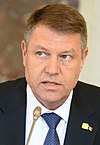Presidency of Amathia
This article is incomplete because it is pending further input from participants, or it is a work-in-progress by one author. Please comment on this article's talk page to share your input, comments and questions. Note: To contribute to this article, you may need to seek help from the author(s) of this page. |
| Presidency of Amathia | |
|---|---|
| Ⱂⱃⰵⱎⰵⰴⰵⱀⱌⰹⰰ Ⰰⰿⰰⰸⰹⰵⰹ Președenția Amathiei | |
 Logo of the Presidency of Amathia | |
| Residence | Cotroceni Palace |
| Appointer | Popular vote |
| Term length | Five years, renewable once |
| Inaugural holder | Iulia Paler |
| Formation | 28 March 1940 |
| Website | Președenția Amathiei |
The Presidency of Amathia (Amathian: Ⱂⱃⰵⱎⰵⰴⰵⱀⱌⰹⰰ Ⰰⰿⰰⰸⰹⰵⰹ, tr. Președenția Amathiei) is the six-member body which collectively serves as the head of state of Amathia. According to the Constitution of Amathia and the Six Nations' Agreement, the Presidency consists of six members, one elected in each of Amathia's constituent republics. The members of the Presidency are directly elected by a two-round system in their respective republic, for a five-year term. An individual may serve two terms. At the beginning, a member is randomly chosen to become the Chairperson unless he or she was in the incumbent chairperson at the time of the election, but the chairmanship rotates every eight months, to ensure equality.
The office of President was created in 1940, when the Amathian Democratic People's Republic was formed. The Presidency was created in 1981, after the Amathian Revolution in order to replace the office of the President of Amathia, in order to preserve democracy and stop any other attempts of monopolizing power. The Presidency is supposed to equally represent all the constituent republics and all the citizens of the Amathian Democratic Republic.
Amathia is currently led by the 15th Presidency of Amathia, since 21 December 2014.
Members of the Presidency
During his/her term in office, a member of the Presidency may not be a member of any political party, as such, the political parties represented here are those that supported the candidacy of the members during the election.
| Member of Presidency | Joined Presidency | Party | Representing | Chairperson term | ||
|---|---|---|---|---|---|---|
| Augustin Valeria | 
|
12 December 2014 | LED | Odrisia | 12 February 2018 - 12 October 2018 | |
| Manuela Vercezan | 
|
12 December 2014 | FC | Soria | 12 August 2017 - 12 February 2018 | |
| Remus Dorneista | 
|
12 December 2014 | UCD | Preida | 12 August 2015 – 12 April 2016 | |
| Alexandru Iorvel | 
|
12 December 2014 | LZ | Tribaria | 12 April 2016 – 12 December 2016 | |
| Mircea Voroană | 
|
12 December 2014 | PNȚ | Tiria | 12 December 2016 – 12 August 2017 | |
| Sorin Aldrea | 
|
12 December 2014 | NA | Pocuria | 12 December 2014 – 12 August 2015 | |
History
Oath of office
After the Constitutional Court acknowledges the legality of the election, the Chambers of the Senate meet in a joint session. The elected members of the Presidency take the following oath of office, specified by article 82 of the Constitution:
Jur să-mi dăruiesc toată puterea și priceperea pentru propășirea spirituală și materială a poporului amathian, să respect Constituția și legile țării, să apăr democrația, drepturile și libertățile fundamentale ale cetățenilor, suveranitatea, independența, unitatea și integritatea teritorială a Amathiei. Așa să-mi ajute Dumnezeu/Așa să mă ajute Zeii!
I solemnly swear that I will dedicate all my strength and the best of my ability for the spiritual and material welfare of the Amathian people, to abide by the Constitution and laws of the country, to defend democracy, the fundamental rights and freedoms of my fellow-citizens, Amathia's sovereignty, independence, unity and territorial integrity. So help me God/So help me the Gods!
Depending on the religion of the elected members, the oath can be altered in order to suit their religious preference. Sotirian members of the Presidency normally take their oath while holding a Bible or a crucifix in their hands.
Powers and duties
Under the 1981 Constitution, the powers of the Presidency are restrained as opposed to those that the President of the Amathian Democratic People's Republic had, but the Presidency continues to have a significant influence within the semi-presidential Amathian Democratic Republic. The members of the Presidency serve together as the heads of state of Amathia, and decisions are being taken by a simple vote, where the majority wins. If a motion is not approved by a majority of the Presidency's members (four members), the Chairperson can push the motion through, but only if he has the declared support of two other members, and the Chairperson can only use his or her power only once per term, in a situation where the Chairperson believes that the motion is essential for the nation as a whole. The Chairperson is also able to veto a motion even if it has a majority of votes, but only once in a term.
In internal affairs:
- Representing the Amathian State and safeguarding of the national independence, unity and territorial integrity of the country.
- Guarding the observance of the Constitution and the functioning of public authorities.
- Designating and appointing the Prime Minister, subject to the Senate's approval (The Presidency cannot dismiss the Prime Minister.).
- Appointing and removing ministers, on the proposal of the Prime Minister (a proposal by the Prime Minister may be rejected only once; in such cases, the Prime Minister cannot re-submit the same nomination for ministerial office; the Presidency cannot refuse the appointment of a second, different, nominee).
- Consulting the Government on major policy matters.
- Presiding the meetings of the Government debating upon matters of national interest with regard to foreign policy, the defence of the country, insurance of public order, and, at the Prime Minister's request, in other instances as well.
- Addressing messages to the Senate on issues of national interest.
- Promulgating bills (they may be referred back to the Senate only once, for reconsideration).
- Summoning the Chambers of the Senate after a legislative election.
- Requesting the convocation of an extraordinary session of the Senate.
- Dissolving the Senate (The Presidency may dissolve the Senate if no vote of confidence has been obtained to form a government within 60 days after the first request was made, and only after rejection of at least two requests for investiture.).
- Calling referendums (after consultation with the Senate).
In foreign affairs:
- Concluding international treaties negotiated by the Government and submitting them to the Senate for ratification.
- On proposal by the Government, accrediting and recalling diplomatic envoys.
- Receiving letters of credence from foreign diplomatic envoys .
- Approving the setting up, closing down or change in rank of diplomatic missions.
In defence issues:
- The Chairperson of the Presidency exerts the role of Supreme Commander of the Armed Forces.
- The Chairperson of the Presidency presides over the Supreme Council of National Defense.
- Declaring mobilisation of the Armed Forces, subject to prior approval of Parliament (or, in special circumstances, subsequent approval).
- Taking measures to repel armed aggression towards the country.
- Instituting the state of siege or the state of emergency (nationally or locally, with subsequent senatorial approval).
Other duties:
- Conferring decorations and titles of honour.
- Making promotions to superior military ranks.
- Making appointments to public offices as provided by law.
- Granting individual pardons.
In the exercise of its functions, the Presidency issues decrees which are obligatory in the country. The decrees issued by the Presidency of Amathia in the exercise of its powers, as provided under the Constitution must be countersigned by the Prime Minister in order to take effect.
Impeachment
An incumbent member of the Presidency who severely violates the Constitution may be suspended by the Senate in a joint session of the Chambers. If the suspension motion passes, there is a call for a referendum of impeachment within no more than 30 days from the suspension.
If the Chamber of the People and Chamber of the Nation, in a joint session, accuse a member of the Presidency of high treason, the member of the Presidency is suspended from powers and duties by right. The accusations are judged by the High Court of Cassation and Justice. The member of the Presidency is dismissed by right if found guilty of high treason.
Succession
Should a position in the Presidency become vacant due to resignation, impeachment, permanent inability to perform the duties of office, or death, the President of the Chamber of the Nation or the President of the Chamber of the People, in that order, step in as Ad Interim member of the Presidency of Amathia (Amathian: Membru Interimar al Președenției Amathiei). Neither relinquish their position as President of their respective Legislative House for the duration of the Ad Interim term. An Ad Interim President cannot address the Senate, dissolve the Senate, nor call for a referendum (the impeachment referendum after a motion of suspension is called by the Senate). The vacancy of the position cannot be longer than three months. While a member of the Presidency is suspended, the position is not considered vacant.